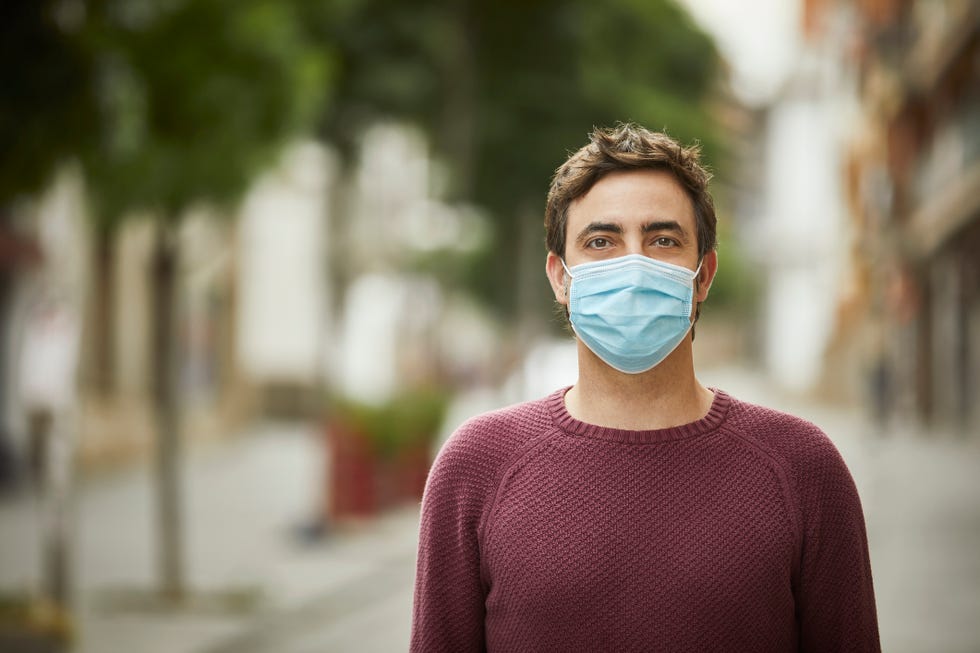File this under: department of silver linings. While you are probably already experiencing severe mask fatigue, and the thought of having to cover up for months (years?) to come is as exhausting as it is unavoidable, there is an extra health benefit you may not have anticipated. Yep, masks might help protect you against some of the health risks of exposure to air pollution.
By now, you know that masks slow the spread of the coronavirus. But the novel coronavirus isn’t the only life-threatening element floating through your air. According to the American Lung Association, exposure to air pollution is associated with respiratory symptoms, cardiovascular disease, and even premature death.
The list of conditions and illnesses that have been linked to air pollution is excruciatingly long. For starters, that list includes asthma, lung cancer, and low infant birth weight. But, it turns out that masks actually offer some measure of protection. (Btw: Did you know masks can also help protect against the flu?)
How beneficial is the average mask and are all types equally effective against pollution? Richard Peltier, associate professor of environmental health science at the University of Massachusetts Amherst, breaks it down.
Do masks—N95s, surgical masks and cloth masks—protect us from pollution as well as COVID-19?
Peltier: If we’re just talking about what we call ambient air pollution—that’s the stuff that comes out of factories and the tailpipes of cars and trucks—the answer is yes. When you’re wearing an N95 mask (or a KN95 mask, which is the Chinese equivalent), it actually does protect you from that kind of exposure. Those masks do a pretty good job of filtering out the smallest particles.
When you move to the low-tech solutions—the cloth masks and bandanas, or surgical masks—these often have very little effect because the particles are so small, and they can pass right through those fibers in a surgical mask or that cloth mask. That doesn’t mean that they provide zero protection though.
We did a study in 2016 looking at that—it’s on an order of 15 to 30 percent of the particles blocked. So a cloth mask is better than nothing, but some people get a false sense of security and think, “Well, I have my bandana on and I shouldn’t have to worry about avoiding that construction site across the street, or that big pickup truck spewing diesel exhaust.”
This content is imported from {embed-name}. You may be able to find the same content in another format, or you may be able to find more information, at their web site.
What are the differences between cloth masks, such as a bandana, and surgical masks when it comes to pollution?
Peltier: Neither fit very well over the gaps around your face. When you take a deep breath, particles or air pollutants will often pass through those little gaps on the side of your cheeks and the bridge of your nose. So they perform equally poorly in terms of their fit.
But leaving that aspect aside, it turns out that surgical masks are the better of the two, and that has to do with the engineering of the fabrics themselves. The fabric in a surgical mask is made of very tightly woven little fibers that are stuck together. You can’t see through a surgical mask. You can hold it up to the sunlight, but you can’t see through it. Whereas with a cloth mask if you hold it up you can see right through it. So when it comes to performance, the surgical mask material filters better than cloth masks.
Is there any danger of a mask being too tightly woven? I have a cousin who thinks that if she wears a mask it will make her sick because she’ll be breathing in her own germs.
Peltier: Very often when I publish work on face masks, that conspiratorial population finds me and they accuse me of killing people because I’m encouraging them to wear face masks. This year in particular this issue was deeply politicized for all sorts of reasons, and that has led to these crazy Facebook theories: how wearing a mask can make you sick, or breathe too much carbon dioxide. And it’s just not true.
Any physician or technician or nurse will be quick to tell you that there’s really no impact on their performance. If a surgeon can operate for eight hours wearing a face mask, without any ill effect, you can walk to the grocery store, and be just fine.
